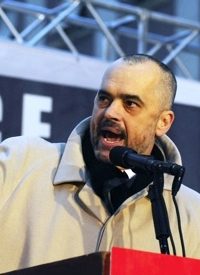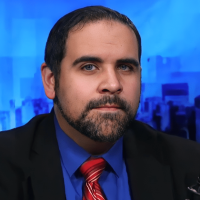
As country after country attempts to recreate the historic events in Tunisia and Egypt, most of the world’s and media’s attention has been focused on the Middle East. Cable news reports often depict a map of the region with the countries in turmoil highlighted: Morocco, Algeria, Tunisia, Libya, Egypt, Sudan, Jordan, Syria, Iraq, Iran, and Yemen. But no matter what cable news station one watches, one country — in the midst of turmoil and anti-government protests — remains unhighlighted and unmentioned on those maps: Albania.
In that beleaguered country on Friday, February 18, tens of thousands staged protests organized by Edi Rama (photo, left), the Mayor of Tirana and leader of the opposition Socialist Party of Albania.
The Socialist Party of Albania is the successor to the Party of Labour of Albania, Albania’s former ruling communist one-party — its equivalent to the Communist Party of the Soviet Union during the Cold War — and is currently a participating member of the Socialist International.
Although police did not provide an estimate of the total number of protesters, Socialist leaders claimed a turnout of over 200,000 demonstrators. They demonstrated outside the office building of Prime Minister Sali Berisha, demanding the resignation of the current government and called for early elections.
The Socialist Party also staged protests in front of Prime Minister Berisha’s office this past January 21, when four protesters were fatally shot.
On January 24, 2011, the Socialist International issued a Statement on Albania on the first round of protests calling for an end to corruption and for greater transparency in government elections, to guarantee democracy:
The Socialist International, in line with its previously expressed views, is increasingly alarmed by the deteriorating situation in Albania. Our organisation has already addressed in its meetings the need to guarantee democracy in Albania, including the transparency of the election administration, the accountability of the executive and legislative power, the freedom and independence of the judiciary and the media, and equal rights and opportunities for citizens.
The latest exposure of grave misconduct in the case affecting Deputy Prime Minister Ilir Meta, which led to his resignation, points once more in the direction of our earlier appeals for real democracy and good governance in that country.
The statement continued with a condemnation of recent violence and for the “apprehension” of the individuals responsible:
The Socialist International denounces the killing of three protesters in Tirana last week during a demonstration in which Albanian citizens expressed their concerns following these latest developments. We call for the immediate investigation of those killings and for the authorities to act on the apprehension of those responsible for these crimes.
Our International appeals for a peaceful and democratic solution to the current crisis which is further undermining stability in the country, and expresses its full solidarity with its member the Socialist Party of Albania.
Earlier this month, Socialists staged protests all across Albania in Tirana, Korce, Leger, and Vallon, again calling for the resignation of the government and new early elections.
“The opposition, led by the Socialists will continue mass protests,” Tirana Mayor Edi Rama told his supporters then, and right he was, as more protests erupted on Friday.
On Friday, the newly reinvigorated crowds were shouting slogans: “New elections” and “Berisha Murderer.” Other protesters waved signs reading “Sali Logout” and “Change, Sali Mubarak,” likening PM Berisha to the recently deposed Egyptian President Hosni Mubarak.
In a message to the protesters, Socialist opposition leader Mayor Rama vowed that the protests will continue until the ruling coalition government steps down and accedes to early elections, before the schedule 2013 national elections.
“We will continue to demonstrate to remove the current regime out of power,” Rama told his supporters Friday as they protested in front of Berisha’s office. “We are the only hope to give an end to the injustice and give Albania a fair governance,” Canadian Press reported Rama telling protesters. “We do not want to come to power through demonstrations but we shall keep on demonstrating to oust this government. Here are the people asking for fresh, free and fair elections.”
In an interview with Associated Press Television, Rama accused the ruling coalition government of “killing people after having stolen elections to rob the country.” Until a peaceful resolution is achieved, he said, Albania will continue to suffer “a crisis that is harming every day the country and the common people.”
The events that precipitated the 2011 protests in Albania can be traced to disputed national elections in June of 2009, when Berisha’s Democratic Party narrowly managed to win a majority along with other coalition parties, defeating the Socialist Party.
Since his party’s loss, Rama has maintained that the election results were fabricated, claiming voter fraud and other deceptive tactics on the part of the government.
The situation was further inflamed when on February 10, 2011, in Albania’s parliament, fistfighting broke out among parliamentarians after a video of Deputy Prime Minister Ilir Meta was retrieved from his laptop, allegedly depicting him ordering one of his subordinates to accept a government contract for a hydroelectric power plant.
According to Reuters, Meta, who is a close ally of Prime Minister Berisha in Parliament, was forced to resign as a result of the controversy and accusations of corruption generated by the video, which he dismissed as a “fabrication” and an “ugly political and moral bluff.” Meta maintains that he is innocent, accusing his political enemies — the Socialist Party — of manipulating the contents of the video in favor of their case against him.
His resignation has been used by the Socialists as a propaganda piece upon which to base their accusation that the entirety of Berisha’s government is corrupt and should step down as soon as possible in order to make way for early elections.
Prime Minister Berisha has since then called upon Parliament to launch an official probe into accusations of Meta’s corruption; however, Members of the Socialist Party in parliament are refusing to cooperate, claiming they do not wish to take any part in attempts by the government to cover up what it claims is the truth.
The situation in Albania continues to escalate as Rama and his Socialist forces hope to create an anti-Mubarak style revolution to force Berisha and the Democrats out of power in order to facilitate what Rama hopes will be a new Socialist government in Albania.
Photo: Opposition Socialist Party leader Edi Rama speaks to supporters at an at an anti-government demonstration held outside the main government building Friday, Feb. 18, 2011: AP Images



